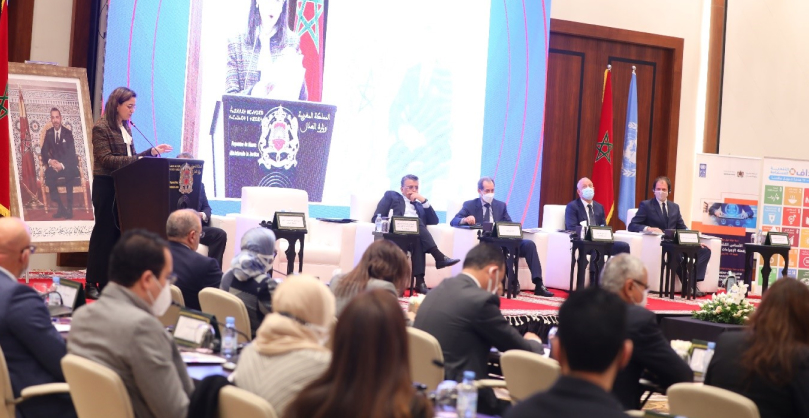Impact by Regions, Countries & Territories
UNDP’s Global Programme supports crisis-affected contexts across all regions to strengthen the rule of law and human rights. In this section, we present five regional overviews, detailing our priorities and approach depending on the context, as well as feature select country and territory results from 2021.
Five contexts from the list (Central African Republic, Democratic Republic of the Congo, Haiti, Mali and Yemen) illustrate the achievements of the Global Focal Point for the Rule of Law (GFP). In peacekeeping missions and transition settings, UNDP’s Global Programme works through the GFP to deliver integrated assistance with our UN partners.
GFP Global Focal Point Highlights
Political
Engagement
The rule of law is essential for sustainable peace and resilient economies, as well as for the prevention or recurrence of conflict. To prevent or address injustice, inequalities or democratic deficits, UNDP works with multiple stakeholders to operate in a way that is consistent with the rule of law and creates opportunities for all individuals to exercise their rights and access justice.
Institution
Building
The importance of strong institutions is more evident than ever as countries and communities respond to disruption, whether because of public health restrictions, climate change or political upheaval. Limitations on public gatherings and travel have revealed the need for institutions that are resilient to disruption.
Community
Security
2021 was a pivotal year that saw various developments affecting peace and security around the world. Civic space continued to shrink and the social contract between states and citizens was increasingly challenged, particularly during and after the response to the COVID-19 pandemic. Facing distressing consequences of climate change, states and communities are forced to manage more cross-border conflicts, triggered by the displacement of people seeking increasingly scarce resources.
Human Rights
Systems
The scope of human rights challenges is widening, from eroded public trust and shrinking civic space to ongoing inequality and human rights impacts in the socio-economic repercussions of the COVID-19 pandemic, and emerging risks in the digital sphere. National human rights institutions (NHRIs), along with other human rights defenders, are facing rising and sophisticated forms of reprisals for carrying out their work.
Access to
Justice
Sustainable Development Goal 16 (Peace, Justice and Strong Institutions) of the 2030 Agenda highlights the importance of access to justice for all for the development of peaceful and inclusive societies. Meaningful access to justice can only be achieved when people know their rights, have the opportunities, agency and capacities to claim them, and have access to independent, inclusive and people-centred justice systems that will respond in a timely, fair and effective manner.
Transitional
Justice
Without justice, there can be no lasting peace. In post-conflict, crisis-affected and fragile contexts, truth-seeking initiatives and reconciliation efforts are essential to bring peace to affected communities. The COVID-19 pandemic has slowed down transitional processes as states prioritized their response to the health crisis and measures to support the economy.
Gender
Justice
In 2021, the continued erosion of democracy and the spread of authoritarian trends in politics in many parts of the world contributed to a backlash against women’s rights. The COVID-19 crisis has reversed some of the hard-won gender parity gains by exacerbating pre-existing inequalities and power imbalances. It has also caused a dramatic increase in sexual and gender-based violence (SGBV). All these challenges have been particularly acute in conflict, fragile and crisis-affected settings.
Innovation
New ideas and new strategies are critical to building sustainable and effective development approaches that really meet people’s needs. Technologies and globalization raise new human rights concerns and threaten the rule of law. Responses to the COVID-19 pandemic continue to limit people’s access to basic services. UNDP connected expertise across the globe to learn and adapt. Creating a culture of curiosity and experimentation, these efforts ensured that local needs and expertise were combined with emerging models to bring strategic thinking to people-centred development goals.

Morocco
In Morocco, a joint technical working group was established between UNDP and the Ministry of Justice, UNDP’s key partner for the rule of law programming in the country. This cooperation enabled stronger and more effective engagement with other justice stakeholders, such as the Supreme Judicial Council and the Public Prosecutor’s Office, ensuring that both UNDP and its institutional partners have a clear shared understanding of programme activities, implementation priorities and people-centred approach. This coordination, including through the working group, has resulted in the extended rule of law programming in Morocco.
In 2021, UNDP signed a Memorandum of Understanding with the MoJ to work on the justice sector reform. This effort has led to the design of a joint programmatic framework to be implemented starting in 2022 to enhance justice for all in the country through digital transformation. In Morocco, where the justice sector has been particularly affected by low levels of public confidence and allegations of improprieties, the promise of digital justice was well accepted. To implement the justice reform, UNDP facilitated a tripartite partnership in digital transformation, among three key judicial independent bodies: the Ministry of Justice, the Supreme Judiciary Council and the Public Prosecutor’s Office. The Ministry of Justice organized an international conference to analyse best practices and decide on the legal framework for digitization of judicial processes in Morocco.
With UNDP’s support and due to its catalytic funding, the Ministry of Justice will lead and fund a project on the digital transformation of justice in the next four years.

Key Results: Morocco
Technical assistance provided to develop three comprehensive project proposals on the reform of the justice sector.
A Memorandum of Understanding was signed between UNDP and the Ministry of Justice.
An international conference on the legal basis for the digitization of judicial procedures was organized, where eight countries presented their experiences and more than 100 legal professionals participated. Following the event, all notes and recommendations were compiled into a report that will serve as a roadmap to further improve the legal framework for digital justice in Morocco.
